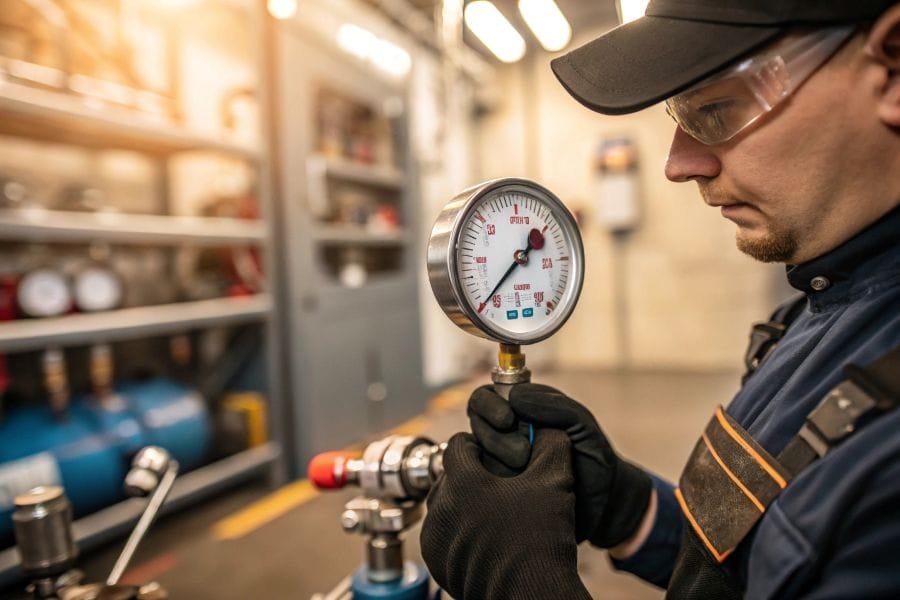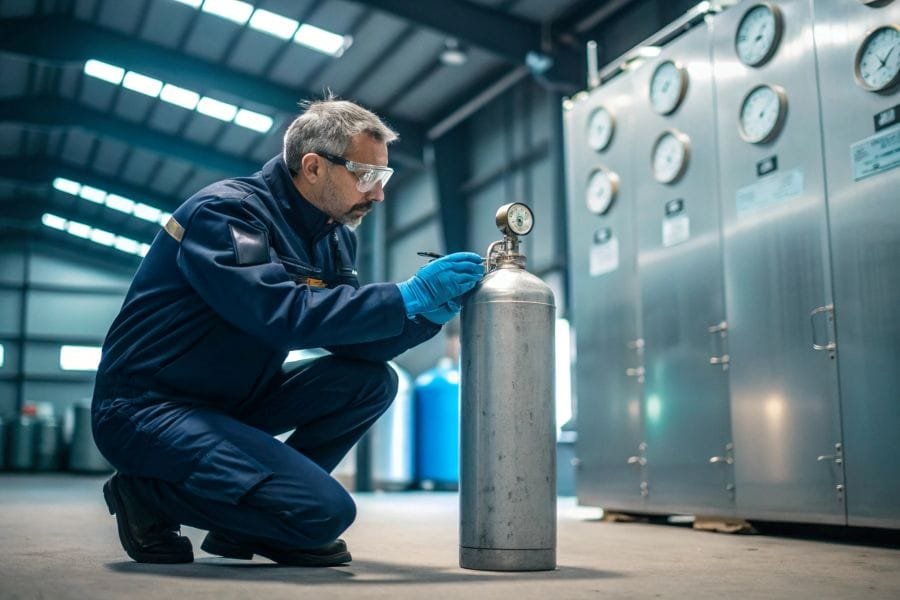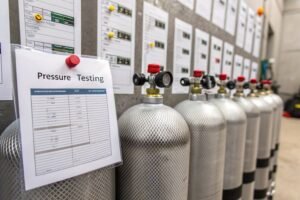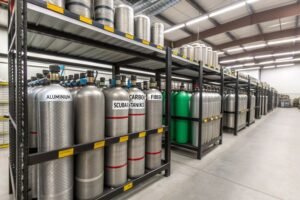Your divers trust you with their lives. A single equipment failure can destroy that trust and your business. The solution starts with choosing a manufacturer who prioritizes safety above all else.
A reliable manufacturer prevents out-of-air risks through strict quality control, using certified high-grade materials like 6061 aluminum, and following international testing standards like ISO 7866. This ensures every cylinder is safe, durable, and performs flawlessly under pressure, protecting both divers and your business.

I've spent my career in the gas cylinder business. I have seen firsthand what separates a safe, reliable cylinder from a dangerous one. It is not just about the final product you hold in your hands. It is about a deep commitment to quality at every single step of the process. For business owners like you, understanding this process is not just a technical detail. It is the foundation of your reputation and your customers' safety. Let's explore what that really means.
Why is the structural integrity of a scuba tank a critical issue for wholesalers and dive centers?
You might think a tank is just a simple container. But a single cylinder failure can lead to legal nightmares and shatter customer trust. You must see tank integrity as business integrity.
For wholesalers and dive centers, strong tank integrity is essential. It directly impacts diver safety, customer trust, and brand reputation. A failure can lead to severe legal and financial consequences. This makes it a critical business issue, not just a technical one.
The Business Impact Beyond a Single Dive
When I talk to clients, I always stress this point. A faulty scuba tank is not just an equipment problem. It is a business-ending event waiting to happen. Imagine the consequences. The legal liability alone could be immense. Your insurance premiums would skyrocket, if you can even get coverage. But the damage goes deeper. Your brand, which you have worked so hard to build, becomes associated with risk and danger. I once saw a competitor struggle after a safety incident. Their sales dropped, and they spent years trying to rebuild the trust they lost in a single day. The financial cost of prevention is tiny compared to the cost of a single failure.
The Ripple Effect on Customer Trust
The diving community is a tight-knit world. Word travels fast. One diver's bad experience with a faulty tank does not stay with that one diver. They will tell their friends. They will post on forums and social media. Soon, your business is the subject of a story about "that time a tank failed." This erodes the foundation of your business, which is the trust your customers place in you. They trust you to provide safe, reliable gear. When that trust is broken, it is incredibly difficult to earn back. It creates a ripple effect that can harm your business for a very long time.
Your Role as a Quality Gatekeeper
As a wholesaler or dive center owner, you are the gatekeeper. Your customers are not experts in cylinder manufacturing. They depend on you to source the best and safest equipment. They trust your judgment. This means your reputation is tied to the quality of the suppliers you choose. When you select a tank, you are putting your name on it. Choosing a supplier with a proven track record of quality and safety is not just a good business decision. It is your responsibility to your customers.
What are the key differences in manufacturing aluminum versus carbon fiber scuba tanks that impact safety?
You see both aluminum and carbon fiber tanks on the market. But choosing the wrong type for your specific customer base could be a costly mistake. You need to know the manufacturing differences.
The main difference is in the construction. Aluminum tanks are extruded from a single piece of metal, making them very robust. Carbon fiber tanks use a thin metal liner wrapped in strong carbon fiber. This makes them lighter but requires a more complex process to ensure safety.
The Aluminum Advantage: Robust and Reliable
Aluminum tanks are the workhorses of the diving industry for a reason. We make our aluminum cylinders from a single, solid billet of high-strength 6061 alloy. The process is called backward extrusion. A machine pushes a powerful ram into the billet, forcing the aluminum to flow upwards and form a seamless shell. There are no welds or joints, which means there are fewer potential weak points. After it is formed, the cylinder goes through a controlled heat treatment process. This strengthens the metal to its final T6 temper. This process creates a tank that is incredibly durable. It can handle the bumps and scrapes of daily use at a busy dive center, making it a very safe and reliable choice for most recreational diving.
The Carbon Fiber Edge: Lightweight Performance
Carbon fiber tanks are all about high performance and low weight. The manufacturing process is more complex. We start with a very thin aluminum liner. This liner acts as a gas-tight barrier. Then, we use a computer-controlled machine to wind carbon fiber filaments around the liner. These filaments are mixed with a special resin. The machine wraps them in precise patterns to give the cylinder its strength. The final step is curing the tank in an oven. This hardens the resin and fuses the carbon fibers into a strong, solid shell. This process makes the tank much lighter than an aluminum one of similar size, which is great for technical divers or traveling divers. But, it also means the quality of the wrapping and curing is critical to its safety.
Comparing the Two Materials
| Feature | Aluminum Cylinder (6061-T6) | Carbon Fiber Composite Cylinder |
|---|---|---|
| Manufacturing | Extruded from a single metal billet | Thin aluminum liner wrapped in carbon fiber |
| Weight | Heavier | Significantly lighter (up to 50% less) |
| Durability | Very robust, handles impacts well | More sensitive to surface damage or impacts |
| Buoyancy | More negatively buoyant | Closer to neutral, or even positive when empty |
| Primary Use | Recreational diving, rental fleets | Technical diving, traveling divers, firefighting |
| Cost | More affordable | More expensive |
Which international standards and quality control tests must a cylinder pass to be considered truly reliable?
A supplier might tell you their tanks are "high quality." But that is just an empty phrase without proof. You should always demand to see certifications for specific international standards.
A truly reliable scuba cylinder must meet standards like ISO 7866 for seamless aluminum or ISO 11119 for composite cylinders. Key tests include hydrostatic testing, burst testing, and cycle testing. These tests ensure the tank can withstand pressure far beyond its working limit.

The Blueprint for Safety: ISO and DOT
These acronyms are your guarantee of quality. ISO stands for the International Organization for Standardization. DOT stands for the Department of Transportation in the USA. These organizations create the rules for manufacturers like me. For example, our aluminum cylinders for the European market are made according to the ISO 7866 standard. For cylinders going to North America, we follow the DOT-3AL standard. These standards are not suggestions; they are strict requirements. They tell us exactly what materials to use, how to form the cylinder, and what tests we must perform. If a supplier cannot show you a current certificate for these standards, you should not do business with them.
Key Tests We Perform in Our Factory
I want you to understand what happens inside our factory to guarantee safety. We do not just test a few cylinders from each batch. We test every single one.
- Hydrostatic Test: Every single tank is filled with water and pressurized to 1.5 times its working pressure. For example, a 200 bar tank is tested to 300 bar. We check to see if the tank walls expand too much. This confirms the tank's structural integrity.
- Burst Test: We take cylinders from each batch and test them to failure. We keep increasing the pressure until the tank bursts. The standards require it to withstand at least 2.5 times its working pressure, but our tanks often go much higher. I watched one last week. It is loud, but it is the ultimate proof of strength.
- Cycle Test: We also take tanks and subject them to thousands of pressure cycles, from empty to full. This simulates a lifetime of use. It ensures the metal does not weaken over time. This test is critical for proving long-term durability.
How can consistent material sourcing and advanced production lines prevent premature tank failure?
You might get a great batch of tanks from a supplier. But the next order is full of problems and defects. This inconsistency is a huge red flag. True quality comes from a consistent process.
Consistent sourcing ensures every tank is made from certified, pure aluminum alloy, with no impurities that can create weak spots. Advanced production lines use automation and precise controls to guarantee every step is identical and flawless. This eliminates the small mistakes that can lead to big failures.
It All Starts with the Raw Material
The safety of a cylinder begins long before we turn on our machines. It starts with the aluminum itself. We only source our 6061 aluminum billets from top-tier suppliers who provide a material certificate with every shipment. This certificate is like a birth certificate for the metal. It shows the exact chemical composition and confirms there are no dangerous impurities. A tiny bit of the wrong element in the alloy could create a microscopic weak spot. Under 200 bars of pressure, a microscopic weak spot becomes a major failure point. We refuse any material that does not meet these strict specifications. This commitment to pure, certified material is the first and most important step in our entire process.
The Power of a Controlled Process
In our factory, we have five modern production lines. Consistency is our main goal. We use computer-controlled (CNC) machines to cut the threads on every cylinder neck. This ensures that a regulator will fit perfectly and safely every single time. Our heat treatment ovens have sensors throughout to ensure every part of the cylinder reaches the exact same temperature for the exact same amount of time. This guarantees uniform strength. We even have internal inspection cameras that can check the inside surface of the tank for any flaws. This level of automation and control removes human error. It means that the 10,000th cylinder we produce is identical in quality to the first one. This is how we prevent premature failures.
What questions should you ask a potential supplier to ensure their cylinders protect your divers and your reputation?
You need to find a new supplier for your business. But asking the wrong questions can lead to a frustrating partnership and low-quality products. You can use a simple checklist to find the right partner.
You should ask potential suppliers for their specific certifications, like "Are you ISO 7866 certified?". Ask about their material traceability, their quality control procedures for each batch, and their typical lead times. Their answers will show you their level of professionalism.
Questions About Quality and Certification
This is where you start. The answers to these questions are not negotiable.
- "Can you provide me with current copies of your ISO, DOT, or CE certifications?" A good supplier will have these ready to send immediately.
- "Can you show me a material certificate for the aluminum alloy you use?" This proves they are serious about their raw materials.
- "What is your batch rejection rate inside your factory?" A low rate shows they have good process control. A zero rate might be a red flag, as it could mean they are not testing thoroughly.
- "Can you trace this specific cylinder back to its original material batch and test results?" The ability to do this shows a very high level of quality control.
Questions About Process and Lead Time
These questions help you understand what it will be like to work with them. This is very important for avoiding frustration.
- "What is your actual production capacity per month?" This tells you if they can handle your order volume.
- "What is your standard lead time, from placing an order to shipment?" A clear answer helps you manage your inventory.
- "Who will be my main point of contact, and how quickly can I expect a response to my emails?" This addresses the communication issue directly. A good partner will guarantee a prompt response. I make sure my clients have my direct email.
Red Flags to Watch For
Pay close attention to how they answer. Vague responses are a big red flag. If they say things like "we have very high quality" but cannot provide certificates, be careful. If they are unwilling to discuss their testing procedures or seem annoyed by your questions, it is probably best to walk away. A proud and professional manufacturer will be happy to show you how they build and test their products. They will see your questions as a sign that you are a serious and professional partner, too.
How does partnering with a responsive, factory-direct manufacturer improve both safety and your bottom line?
You might be dealing with slow trading companies or middlemen. This often causes delays, communication errors, and higher costs. Going factory-direct is a smarter way to do business.
A responsive, factory-direct partner gives you clear communication, faster lead times, and lower costs. This direct line to the source means you get accurate information about production and quality. This directly improves the safety and reliability of your supply chain.
Cutting Out the Middleman
When you work directly with a factory like mine, you remove a layer of communication. This has two big benefits. First, it lowers your cost. There is no trading company adding their own markup to the price. You get the best possible price directly from the source. Second, and maybe more important, it eliminates communication errors. I speak directly with my clients. They can ask me technical questions and get an accurate answer immediately. Nothing gets lost in translation. This ensures you get exactly what you ordered and that any issues are resolved quickly. It makes the entire process more efficient and less frustrating.
The Advantage of Fast, Clear Communication
I know that for business owners like you, time is money. Waiting days for an answer from a supplier is not acceptable. When you have a question about a shipment or a technical detail, you need an answer now. A factory-direct relationship provides this. Because we control the entire process, we can give you real-time updates on your production schedule. We can answer your technical questions with confidence. This level of responsiveness builds trust. It makes for a smooth and predictable supply chain, which allows you to serve your own customers better. It's the kind of professional partnership that serious business owners expect.
The Impact on Your Inventory and Cash Flow
Working with a reliable factory has a direct impact on your finances. When you have a supplier with consistent, predictable lead times, you can manage your inventory more effectively. You do not have to order huge amounts of extra stock just in case of a delay. This means less of your cash is tied up in inventory sitting in a warehouse. You can run a leaner, more efficient operation. Predictable delivery means you can promise products to your customers with confidence. This combination of lower costs, better communication, and reliable lead times from a factory-direct partner helps make your business stronger and more profitable.
Conclusion
Choosing the right manufacturer is not just about buying a product. It is about investing in safety, reliability, and a partnership that protects your entire business.






